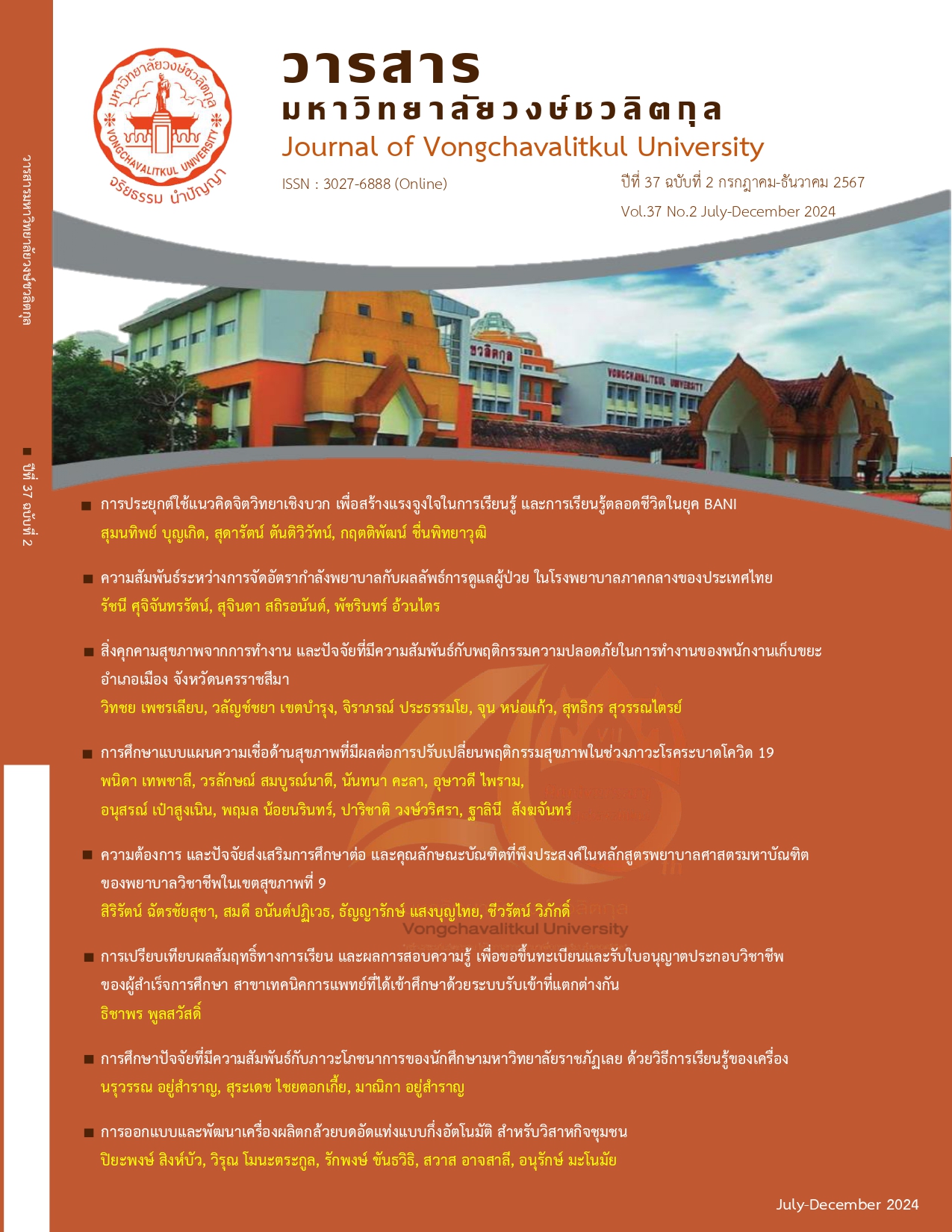Application of Positive Psychology Concepts to Motivate Learning and Lifelong Learning in the BANI Era
Main Article Content
Abstract
The volatile and uncertain global situation, often referred to as the VUCA (Volatility, Uncertainty, Complexity, and Ambiguity) world, has significantly influenced individuals' behaviors, attitudes, emotions, and overall happiness. This shift has transitioned into what is now described as the BANI (Brittle, Anxious, Nonlinear, and Incomprehensible) world, characterized by the emotional and psychological challenges faced in the digital age of unlimited communication. These challenges include increased stress, anxiety, depression, confusion, and difficulties in learning. Positive psychology, which focuses on enhancing quality of life, including physical and mental health, offers valuable strategies for fostering motivation to learn. It enables individuals to adapt effectively to the challenges and changes of the BANI era, thereby cultivating self-learning skills and promoting lifelong learning. The PERMA framework, comprising Positive Emotions, Engagement, Relationships, Meaning, and Accomplishment, provides an effective approach to learning management by fostering positive attitudes and happiness in learning. This framework represents a promising area for future research aimed at optimizing educational practices and outcomes in the context of the BANI world.
Article Details

This work is licensed under a Creative Commons Attribution-NonCommercial-NoDerivatives 4.0 International License.
References
จิราเจต วิเศษดอนหวาย. (2565). Learning loss คือวิกฤตที่รอผู้ใหญ่ทุกคนพลิกให้เป็นโอกาส. Retrieved October 23 from https://www. educathai.com/knowledge/ articles/617
ชวิน พงษ์ผจญ. (2564). การพัฒนารูปแบบการสอนการจัดการเรียนรู้วรรณคดีไทยตามแนวคิดจิตวิทยาเชิงบวกโดยใช้รูปแบบ PERMA กับการจัดการเรียนรู้โดยใช้คุณลักษณะที่เป็นจุดแข็งเป็นฐานเพื่อสร้างเสริมสุขภาวะ ของผู้เรียนระดับมัธยมศึกษา. วารสาร สังคมศาสตร์ และ
มนุษยศาสตร์, 47(1), 137-160.
พนม เกตุมาน. (2561, 17-19 Oct 2018). EDUCA 2018 Workshop for Teachers 4.0 Development [IMPACT Forum,]. The 11th Annual Congress for Teacher Professional., Thailand
พัทธ์ธีรา อุยนันทพิทักษ์, ทำดี กนกพร, นิลโคตร เริงวิชญ์, และ บุญลอย วัยวุฒิ. (2567). การแก้ไขปัญหาภาวะถดถอยทางการเรียนรู้ของผู้เรียนภายในสถานศึกษา: กรณีโรงเรียนวัดไทรทอง สังกัดสำนักงานเขตพื้นที่การศึกษาประถมศึกษาตราด. วารสารปราชญ์ประชาคม, 2(2), 26-39. https://so12.tci-thaijo.org/index.php/watmahasawat_ jsc/article/view/807
วิจารณ์ พาณิช. (2556). การสร้างการเรียนรู้สู่ศตวรรษที่ ๒๑. ส.เจริญการพิมพ์.
สุมาลี สังข์ศรี. (2567). การส่งเสริมให้นักศึกษาในสถาบันอุดมศึกษา เป็นผู้เรียนรู้ตลอดชีวิต. มนุษยสังคมสาร (มสส.) คณะมนุษยศาสตร์ และ สังคมศาสตร์มหาวิทยาลัยราชภัฏบุรีรัมย์, 21(1), 211-233.
อารี พันธ์มณี. (2546). จิตวิทยาสร้างสรรค์การเรียนการสอน. สำนักพิมพ์ใยไหม เอดดิเคท.
AGILITAT. (2020). BANI versus VUCA: a new acronym to describe the world. Retrieved June 4 from https://stephangrabmeier.de/bani-versus-vuca/#infographic
Alam, A. (2022). Positive psychology goes to school: conceptualizing students’ happiness in 21st century schools while ‘minding the mind!’are we there yet? evidence-backed, school-based positive psychology interventions. ECS Transactions, 107(1), 11199.
Bagnall, R. G. (2019). A critique of Peter Jarvis's conceptualisation of the lifelong learner in the contemporary cultural context. In The Learning Adult (pp. 60-75). Routledge.
Csikszentmihalyi, M., Abuhamdeh, S., and Nakamura, J. (2005). Flow. Handbook of competence and motivation, 598-608.
Durwin, C. C., and Weber, M. R. (2018). EdPsych Modules. SAGE Publications.
Iammeechai, W. (2024). Applying Positive Psychology in Medical Curriculum: Creating engaging and meaningful
interactive lecture. Siriraj Medical Bulletin, 17(2), 181–187. https://doi.org/10.33192/smb.v17i2. 265290
Kobkaew J. (2022). VUCA World โลกที่ผันผวนและสลับซับซ้อนยิ่งกว่า Disruption. Retrieved 26 September 2024 from https://www.salika.co/2022/07/29/ vuca-world/
Pongvatnanusorn, P. (2022). Motivation in Music Learning within Cognitive Theories. Journal of Humanities and Social Sciences Uttaradit Rajabhat University, 9(1), 78-90. https://so04. tci-thaijo.org/index.php/johuru/article/view/259581
Purwaniningtyas, D. A., Adira, N., Kusmaryani, R. E., and Nurhayati, S. R. (2023). Teacher well-being and engagement: The importance of teachers' interpersonal relationships quality at school. Psychological Research and Intervention, 6(1), 7-17.
Ratanapitakdhada, C., and Trirat, P. (2023). Educational leaders’ competencies to survive and thrive in a BANI World. The Journal of Pacific Institute of Management Science (Humanities and Social Sciences), 9(1), 16-28.
Seligman, M. E. (1998). Building human strength: Psychology's forgotten mission. APA Monitor, 29, 2.
Seligman, M. E. (2008). Positive health. Applied psychology, 57, 3-18.
Seligman, M. E., and Csikszentmihalyi, M. (2000). Positive psychology: An introduction (Vol. 55). American Psychological Association.
Seligman, , M. E., (2011). Flourish: A visionary new understanding of happiness and well-being. Australia: Random House Australia Pty Ltd.
Tulsuk, A. (2022). จาก VUCA world สู่ BANI WORLD. https://www.coachforgoal. com/blog/topic
Tuntivivat, S. (2017). Positive psychology: Development, applications and challenges. Journal of Behavioral Science for Development, 9(1), 277-290.
Vilarinho-Pereira, D. R. (2021). Dr. Marcy Driscoll: a Leader and an Inspiration. TechTrends, 65(2), 137-138.
World Economic Forum. (2020). These are the top 10 job skills of tomorrow – and how long it takes tolearn them: Top 10 skills of 2025. Retrieved November 30 from https://www.weforum.org/agenda/2020/10/top-10-work-skills-of-tomorrow-how-long-it-takes-to-learn-them/


